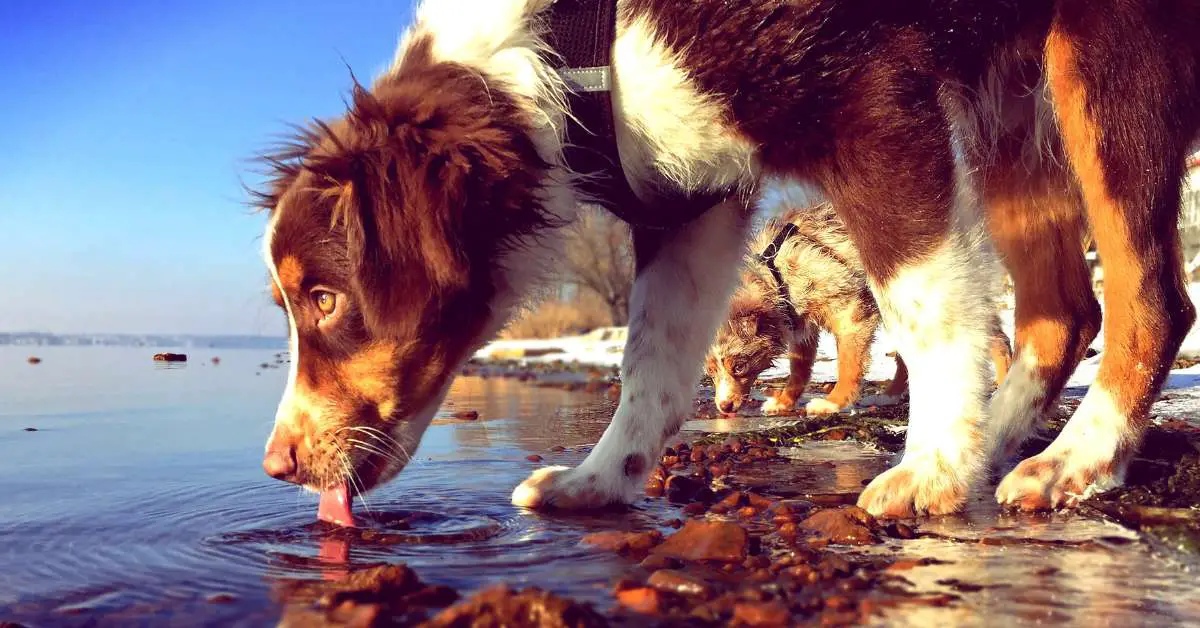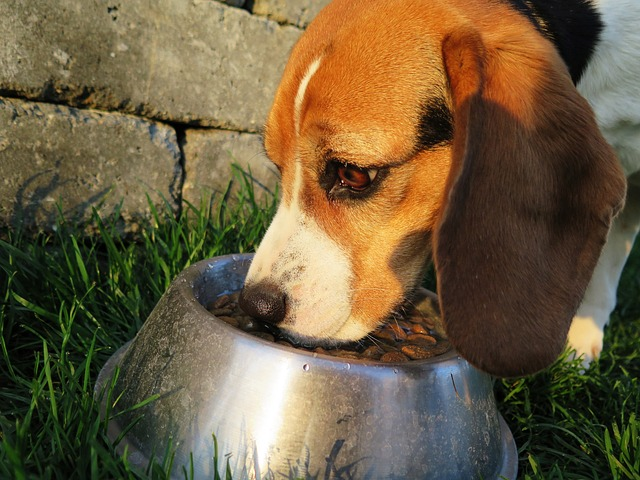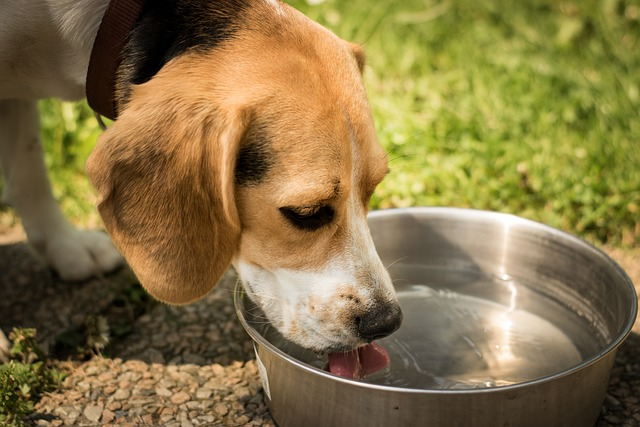Dog Not Eating But Drinking Water – Discover the Truth and Unveiling the Mystery!

Are you feeling anxious and perplexed because your beloved animal companion has abruptly ceased eating while still consuming water? Indeed, it’s a baffling and concerning situation for any pet owner to witness their canine friend losing their appetite out of the blue.
While it’s normal for dogs to have fluctuations in their appetite, a prolonged period of decreased food intake can indicate an underlying issue that requires attention.
In this insightful blog post, we delve into the possible reasons behind your dog’s loss of appetite, while still maintaining their hydration levels. We’ll explore potential health issues, behavioral factors, and practical tips to encourage your pet to eat again.
Keep reading to uncover the mysteries behind a dog not eating but drinking water and discover effective solutions to help your furry companion regain their appetite and overall well-being.
6 Reasons Why Dogs Stop Eating but Continue to Drink Water
As a dog owner, it can be concerning when your furry companion suddenly loses their appetite while still showing a healthy thirst for water.
Several factors can contribute to a dog not eating but continuing to drink water.
Understanding these reasons is crucial in identifying the underlying cause and taking appropriate action.
Here are some common explanations for this perplexing behavior:
1. Illness or Pain:
One of the primary reasons a dog may refuse to eat is illness or discomfort.
Various health conditions, such as gastrointestinal problems, dental issues, infections, or even the presence of a foreign object, can make eating painful or unappealing to your furry friend.
In such cases, dogs often drink water to stay hydrated but avoid food due to the associated discomfort.
2. Stress or Anxiety:
Just like humans, dogs can experience stress and anxiety, which can significantly impact their appetite. Changes in their environment, routine, or the presence of new people or animals can trigger stress in dogs.
Additionally, separation anxiety or fear can also lead to a decreased desire to eat. While they may still drink water to quench their thirst, the emotional state can interfere with their appetite.
3. Aging or Dental Issues:
As dogs age, they may develop dental problems such as gum disease, tooth decay, or painful mouth ulcers.
These issues can make it difficult and painful for them to chew their food, resulting in a loss of appetite.
In such cases, dogs may prefer drinking water, as it doesn’t require the same level of effort or discomfort as eating solid food.
4. Side Effects of Medication:
If your dog is on any medications, it’s essential to check the potential side effects. Some medications can cause a decrease in appetite, leading to a dog refusing to eat.
However, they may still continue to drink water to stay hydrated. If you suspect a medication is the cause, consult your veterinarian for guidance.
5. Change in Food or Routine:
Dogs are creatures of habit and can be sensitive to changes in their diet or routine. Introducing a new type of food or abruptly altering their feeding schedule can cause a loss of appetite.
In these situations, dogs may still drink water to maintain their hydration levels, but the unfamiliar or disrupted feeding routine may deter them from eating.
6. Behavioral Issues:
In some cases, behavioral issues can contribute to a dog’s refusal to eat. Food guarding, where a dog becomes possessive over their food, can lead to anxiety around mealtime, resulting in decreased food intake.
Additionally, attention-seeking behavior or a lack of interest in food due to excessive treats or table scraps can also impact their appetite.

It’s important to remember that a dog not eating but drinking water for more than a day or two should be taken seriously.
If your dog’s loss of appetite persists, accompanied by other concerning symptoms like vomiting, diarrhea, lethargy, or weight loss, it’s crucial to seek veterinary attention promptly.
Identifying Your Dog’s Normal Eating Habits
Identifying your dog’s normal eating habits is important for understanding their appetite and overall health.
Here are some key points to consider:
1. Eating Frequency: Take note of how often your dog typically eats in a day. Most dogs eat one to two meals per day, while puppies or dogs with specific dietary needs may have more frequent meals.
2. Portion Size: Observe the amount of food your dog consumes during each meal. This will help you determine their regular portion size and whether any changes occur.
3. Eating Speed: Notice how quickly your dog finishes their meals. Some dogs eat rapidly, while others take their time. Understanding their typical eating speed can help identify changes in behavior.
4. Interest in Food: Pay attention to your dog’s enthusiasm and interest in their meals. A healthy dog should show excitement and eagerness when presented with food.
5. Consistency of Eating Behavior: Dogs generally have consistent eating habits. Deviations from their usual behavior, such as sudden loss of appetite or reluctance to eat, may indicate an underlying issue.
6. Food Preference: Determine your dog’s food preferences and favorite flavors. This knowledge will help you select appropriate food options and identify changes in their preferences.
When Should I Worry About My Dog Not Eating?
When your dog refuses to eat, it’s natural to be concerned about their well-being. While occasional skipped meals can happen, there are certain situations where you should start worrying about your dog not eating:
1. Duration of Loss of Appetite:
If your dog skips a meal or two but otherwise appears healthy and energetic, it may not be cause for immediate concern. However, if your dog consistently refuses to eat for more than 24 to 48 hours, it’s time to take notice.
Extended periods of decreased food intake can lead to serious health issues and should prompt further investigation.
2. Other Symptoms:
Loss of appetite becomes more concerning when accompanied by other symptoms. Watch out for signs such as vomiting, diarrhea, excessive thirst, weight loss, lethargy, difficulty breathing, or any noticeable changes in behavior.
These additional symptoms can indicate an underlying illness or medical condition requiring immediate veterinary attention.
3. Age and Overall Health:
Consider your dog’s age and general health status. Puppies and senior dogs are more vulnerable to health issues and can experience a quicker decline in condition when not eating.
If your dog falls into these age categories and exhibits a loss of appetite, it’s best to seek veterinary advice sooner rather than later.
4. Sudden and Severe Change in Appetite:
If your dog had a healthy appetite and suddenly stops eating altogether, it’s a red flag.
A drastic change in eating habits, especially when combined with other symptoms, could indicate a severe underlying problem that requires prompt evaluation by a veterinarian.
5. Weight Loss:
Unexplained weight loss is a cause for concern, particularly when accompanied by a decreased appetite.
If your dog is losing weight without any apparent reason or changes in their lifestyle, it’s crucial to investigate the root cause and seek veterinary assistance.
6. Behavioral Changes:
Pay attention to any behavioral changes associated with your dog’s eating habits. If they show signs of distress, anxiety, aggression, or exhibit unusual food-related behaviors, it may indicate a deeper issue affecting their appetite.
Seeking professional advice can help address these behavioral concerns and encourage a healthier relationship with food.
How to Help Your Dog Start Eating Again
To help your dog start eating again:
- Ensure a calm and comfortable environment for mealtime.
- Offer a variety of tasty and nutritious food options.
- Warm up the food or enhance its aroma to make it more appealing.
- Stick to a regular feeding schedule.
- Avoid giving excessive treats or table scraps.
- Address any underlying health issues with a veterinarian.
- Consider hand-feeding or using puzzle toys to stimulate appetite.
- Avoid forcing or pressuring your dog to eat.
- Provide clean and fresh water at all times.
- Monitor your dog’s weight and seek veterinary assistance if the loss of appetite persists.

FAQs
1. How about baby food for dogs who won’t eat?
Baby food can be an option for dogs who won’t eat, but it’s important to choose carefully. Plain, unseasoned baby food without any onions, garlic, or added spices can be offered to entice a dog to eat.
However, it should only be used as a temporary solution and under the guidance of a veterinarian.
Baby food lacks essential nutrients for dogs, so it’s crucial to address the underlying cause of the decreased appetite and transition them back to a balanced dog food diet as soon as possible.
2. My dog isn’t eating but acting normal, what should I do?
If your dog isn’t eating but is otherwise acting normal, monitor their behavior for any concerning symptoms.
If the loss of appetite persists for more than 24-48 hours, consult with a veterinarian to rule out any underlying health issues.
3. How To Diagnose Loss of Appetite in Dogs
To diagnose the loss of appetite in dogs, consult with a veterinarian who can perform a thorough examination, evaluate medical history, conduct necessary tests (such as bloodwork, X-rays, or ultrasounds), and provide a proper diagnosis based on the findings.
Final Notes
In conclusion, a dog not eating but drinking water can be a worrisome situation for pet owners.
Understanding the potential reasons behind this behavior, such as illness, stress, dental issues, medication side effects, or changes in routine, is crucial in addressing the underlying cause.
Monitoring for additional symptoms and seeking veterinary attention when necessary is essential for your dog’s health and well-being.
By taking proactive measures, providing a conducive eating environment, and seeking professional guidance, you can help your furry companion regain their appetite and ensure their overall happiness.

What if you can’t afford a vet and all the tests? They are very expensive, the vet and the test. I missed a appointment with vet because I didn’t have any money, so I was told that I had to pay $78 up front when I make the appointment.
Hi Linda, we understand that vet costs can be challenging. In situations where you can’t afford immediate veterinary care, consider reaching out to local animal shelters or rescue organizations. Some may offer low-cost or free clinics. It’s crucial to explore available resources to ensure your dog’s health. Additionally, keep monitoring your dog’s condition and try to offer easily digestible, bland food in small portions. We hope your pup feels better soon. – Bulldogology Blog Team